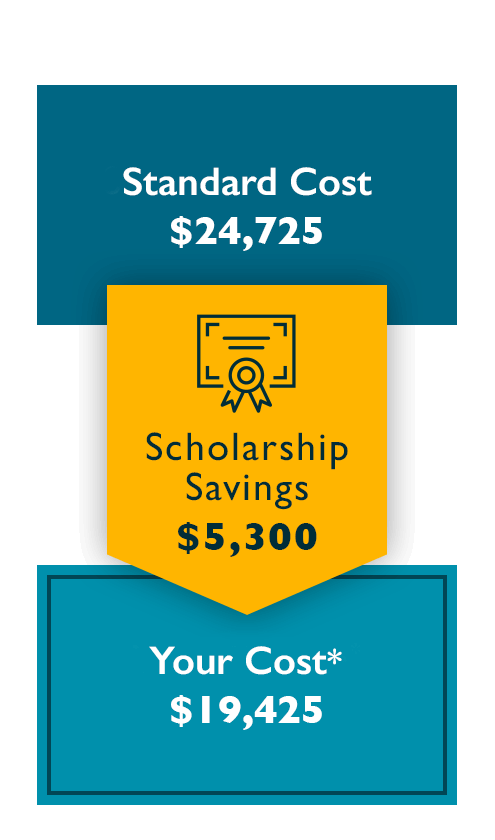Why Choose Walden?
Program Details
Curriculum
Minimum Degree Requirements
- 45 quarter credits
- Foundation course (5 qtr. cr.)
- Core courses (15 qtr. cr.)
- Specialization courses (20 qtr. cr.)
- Capstone course (5 qtr. cr.)
View the COMPLETE CURRICULUM PLAN.
Time to completion will vary by student, depending on individual progress and credits transferred, if applicable. For a personalized estimate of the number of your transfer credits that Walden would accept, call an Enrollment Specialist at 855-646-5286.
Admission Requirements
Program Admission Considerations: A bachelor's degree or higher.
General Admission Requirements: Completed online application and transcripts. Please note that the materials you are required to submit may vary depending on the academic program to which you apply. More information for international applicants.
General Program
General Program
| CURRICULUM COMPONENT | REQUIREMENTS | COST | AMOUNT |
|---|---|---|---|
| Tuition | 45 quarter credit hours | $530 per quarter hour | $23,850 |
| Program Fee | Per quarter | $175 | $875 |
| $24,725** | |||
| BELIEVE & ACHIEVE SCHOLARSHIP YOUR TUITION | -$5,300 $19,425* | ||
*Represents minimum time to completion and Believe & Achieve Scholarship. Your actual total program time and costs may vary. Believe & Achieve Scholarship savings based on current tuition. See Scholarship Details for more information.
**Tuition reflects the minimum time to completion. Time to completion varies by student, depending on individual progress and credits transferred, if applicable. Tuition and time to complete may be reduced if transfer credits are accepted, or if you receive grants, scholarships or other tuition reductions. Walden may accept up to 20 transfer credits. For a personalized estimate of the number of your transfer credits that Walden would accept, call an Enrollment Specialist at 844-875-0977.
Tuition and fees are subject to change. Books and materials are not included and may cost between $1,000 and $1,400.
Program Outcomes
Build an Advanced, Versatile Skill Set
In our online master’s in higher education program, you’ll develop transferable skills that can help you excel in your current job or pursue new opportunities. Explore strategic planning and budgeting and learn how to build a strong culture and high-performing teams. For your capstone, you’ll have the chance to use your new skills and insights to solve a real challenge from your own workplace.
With more people seeking higher education to meet their career goals, demand for postsecondary teachers is on the rise. According to the U.S. Bureau of Labor Statistics, employment of these professionals is projected to grow 9% through 2029.3
With the versatile MS in Higher Education degree, you’ll be ready to pursue a variety of hands-on and leadership roles in academia, business, and government. Gain the skills and confidence to expand your career possibilities and make a positive impact for your organization.
An MS in Higher Education prepares you for job roles such as:4
- Administrator
- Professional developer and trainer
- Academic director
- Research and planning director
An MS in Higher Education prepares you to work in settings such as:
- Community colleges and universities
- Government agencies
- Corporate training and development
- Workforce development
Career options may require additional experience, training, or other factors beyond the successful completion of this degree program.
Learning Outcomes
As a graduate of Walden’s online Master’s in Higher Education program, you’ll be prepared to:
- Apply an understanding of higher education systems, business principles, and student learning in solving institutional problems to drive institutional and student success.
- Make effective decisions based on critical evaluation of research and data.
- Articulate the perspectives and interests of multiple stakeholders.
- Choose leadership approaches appropriate to the culture of the organization.
- Demonstrate an ability to deploy resources to achieve intended results.
- Evaluate the potential impact of policies and processes on student outcomes.
Testimonials
My advisors and my instructors have all played an important role in my life by keeping me on the right track to finishing my degree.
Walden’s curriculum offers a cross-cultural perspective. It is very valuable to have my degree from Walden. It’s a strong point in my professional life.
FAQ About Walden’s Online MS in Higher Education
MS in Higher Education candidates have many options when it comes to choosing the program that is right for them. However, a few key factors should always be considered in your decision-making process, including flexibility, diversity, and support. First, flexible scheduling can be key for working professionals, which is why online degree programs are such a popular choice. It’s also important to be able to connect with other professionals. Those with diverse backgrounds, perspectives, and experiences can greatly enhance your master’s experience. Lastly, be sure you choose a university with a strong support team that is invested in your success as you work toward your advanced higher education degree.
Online programs vary based on a variety of factors, like where you’re earning your degree and the area of focus you choose. For example, Walden University has been educating adult professionals for 50 years and is a known leader in online learning. When you choose to earn your degree from Walden, you’ll be supported at every turn with personal advisors, faculty members who are all scholar-practitioners, and support services that include a Writing Center with 50 full-time writing professionals, a world-class online library, and much more. As for the MS in Higher Education program, you can choose the general program or select one of six specializations that allow you align your studies with your interests and career goals. You will also complete a capstone project in which you will apply what you have learned to a real-word issue or problem.
One of the best, most convenient ways to earn your MS in Higher Education is to enroll in an online program offered by a respected university. With online learning, you can continue working full time and balance your other responsibilities while earning your degree. An online higher education master’s program lets you complete your coursework from anywhere you have internet access. It’s a great way to earn your MS in Higher Education so that you can begin addressing the most pressing issues facing higher education institutions and improve organizational and student success.
With a master’s degree, you can gain the skills and knowledge to develop and lead higher education programs, services, and classes. Individuals with higher education degrees choose from a diverse array of careers in areas including academic advising, academic affairs, corporate training, distance learning, faculty development, marketing, military education, student affairs, finance, and more. The career planning and development team at an accredited university, like Walden, is also available to provide one-on-one counseling, career tools, resources, and strategies that can only strengthen your career path.
Walden’s MS in Higher Education specialization in Adult Learning is designed to provide students with the specific knowledge and skills they’ll need to effectively educate adult learners. Coursework centers on understanding adult development, research-based best practices in adult teaching and learning, and the effects that diversity and multiculturalism can have on motivating adult learners. This program also integrates developmental education, online teaching, and training and performance improvement.
Other specialization options at Walden include College Teaching and Learning and Leadership for Student Success.
1Source: National Center for Education Statistics (NCES) IPEDS database. Collected using Burning Glass Technologies. Retrieved July 2020, using CIP code 13.0406 (master’s degree – Higher Education / Higher Education Administration). Includes 2017–18 final data.
2Source: Walden University Office of Institutional Research and Assessment (OIRA), as of December 31, 2019.
3Source: Bureau of Labor Statistics, Occupational Outlook Handbook, Postsecondary Teachers . National long-term projections may not reflect local and/or short-term economic or job conditions, do not guarantee actual job growth, and are subject to change.
4Source: Burning Glass Technologies Labor Insights™. Industry Analysis, active selections "nationwide" and “last 12 months” and “Industry: educational services” and “keywords: higher education” and. “education: master’s” Retrieved February 2020 .
Walden offers both state-approved educator licensure programs as well as programs and courses that do not lead to licensure or endorsements. Prospective students must review their state licensure requirements prior to enrolling. For more information, please refer to www.WaldenU.edu/educlicensure.
Note on Teacher Licensure or Certification
This program does not lead to teacher licensure or certification. Teachers are advised to contact their individual school districts as to whether this program may qualify for salary advancement.













